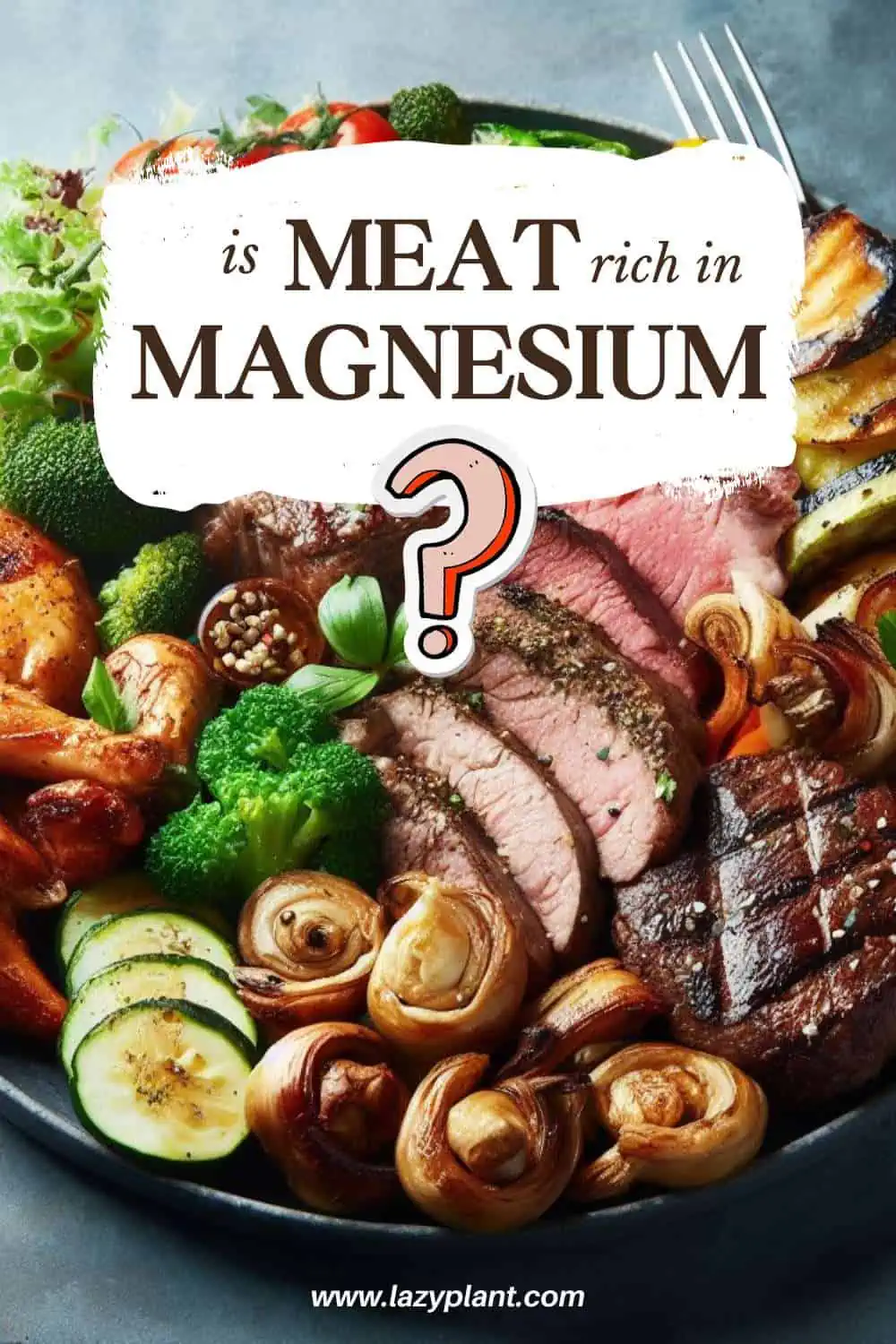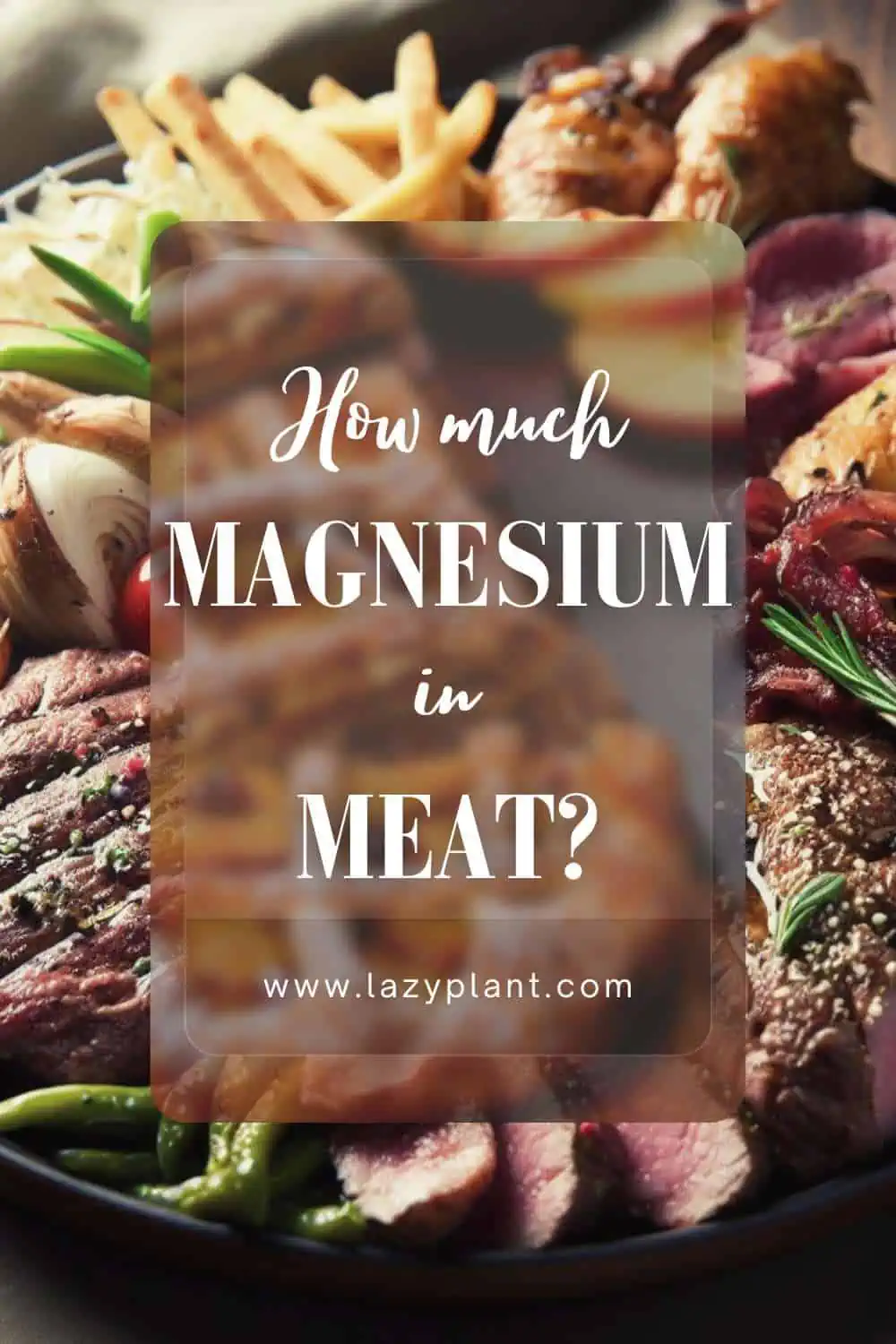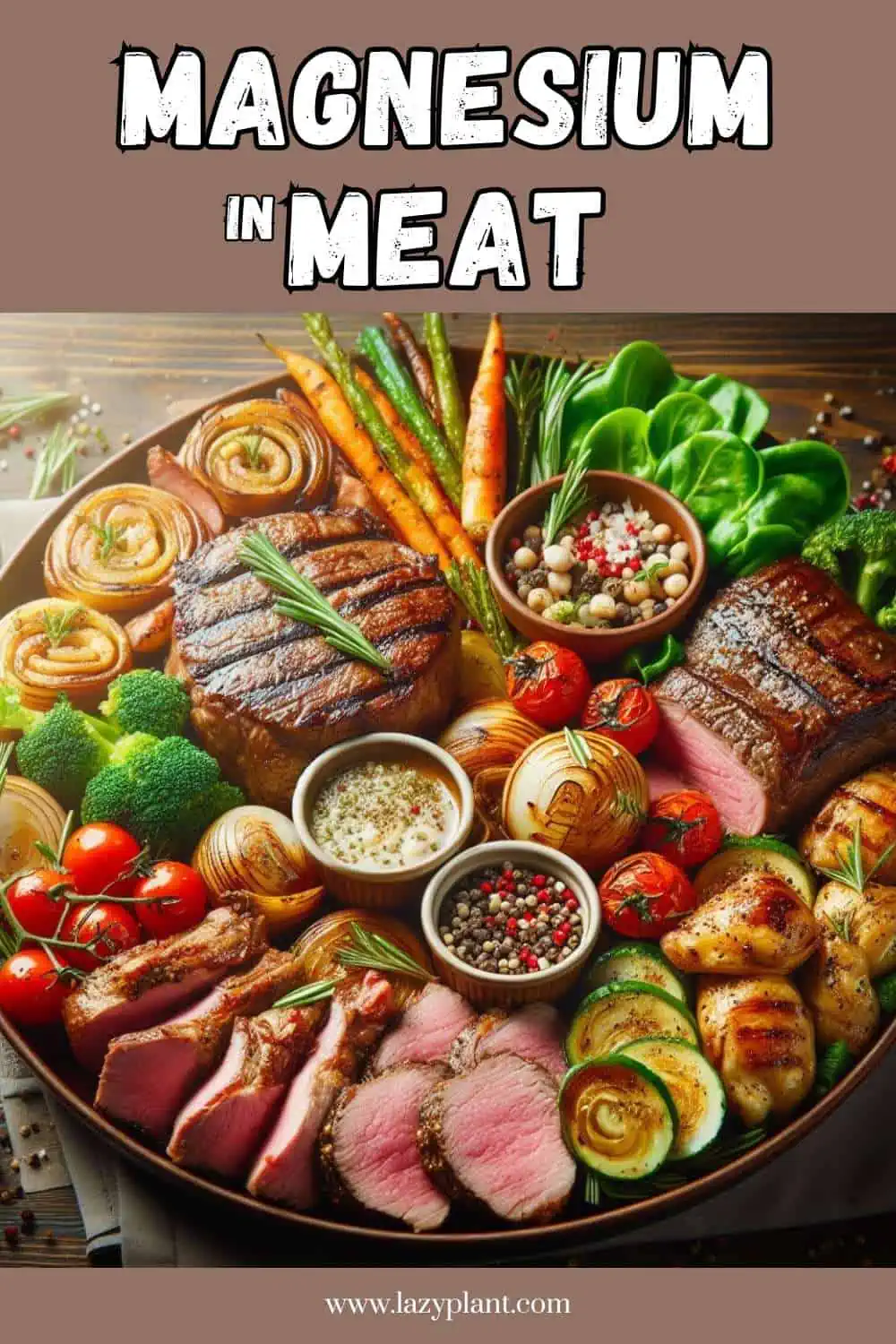Meat consumption can help us meet our daily needs for magnesium. A serving of chicken, turkey, beef, pork, and lamb contains up to 29 mg of magnesium, providing 4-7% of the Daily Value. But, we shouldn’t depend on meat to meet our daily needs.
Is meat rich in magnesium?
Actually, meat has a moderate magnesium content. Although it isn’t particularly high in magnesium, meat contributes to the daily magnesium intake. Mainly because meat is regularly consumed by people who follow the standard American diet.
Poultry is the richest meat in magnesium, containing 30-34 mg per 100g. A serving of chicken or turkey provides 6-7% of the Daily Value.
Pork, beef, and lamb have a lower magnesium content. A serving provides 4-5% of the DV.
| magnesium (mg) per 100g | magnesium (mg) per serving | % DV | |
| chicken, breast | 34 | 29 | 7% |
| turkey | 30 | 26 | 6% |
| chicken, ground | 30 | 26 | 6% |
| chicken liver | 27 | 23 | 5.5% |
| pork, ground | 24 | 20 | 5% |
| beef | 22 | 19 | 4.5% |
| beef liver | 21 | 18 | 4.3% |
| lamb | 20 | 17 | 4% |
| ham | 22 | 6 | 1.5% |
| bacon | 17 | 5 | 1.1% |
Does cooking affect the magnesium content of meat?
You can grill, roast, boil, or fry meat. The cooking method doesn’t affect the magnesium content of meat. Magnesium isn’t vulnerable to heat.
Do we absorb magnesium in meat?
Magnesium in meat is highly bioavailable.
We absorb between 30% and 50% of the magnesium in food. The absorption rate depends on the dose. We absorb less magnesium when high doses are consumed.[2]
In order to consume more magnesium from meat, we have to get adequate amounts of vitamin D, calcium, protein, and fructose.[3,4,5]
On the contrary, high doses of zinc or vitamin D, smoking, alcohol abuse, or certain drugs may impair the absorption of magnesium.
How to eat meat for increased magnesium absorption?
While meat itself is not a particularly high source of magnesium, there are ways to enhance magnesium absorption from your overall diet, including the consumption of meat. Here are some tips to consider:
- Choose lean cuts with bones: Some cuts of meat, particularly those with bones, contain small amounts of magnesium. Opt for lean cuts with bones, such as chicken thighs with skin or fish with bones.
- Consider cooking methods: Some cooking methods may affect magnesium content. Cooking meat in magnesium-rich broths or using magnesium-rich cooking oils may have a small impact.
- Avoid excessive calcium: While calcium is essential, excessive amounts can interfere with magnesium absorption. Balance your calcium and magnesium intake for optimal absorption.
- Pair with magnesium-rich foods: Combine meat with magnesium-rich foods such as leafy green vegetables, nuts, seeds, and whole grains in your meals.

- Include magnesium-rich sides: Have side dishes that are high in magnesium. For example, serve a meat dish with a quinoa salad, steamed spinach, or roasted pumpkin seeds.
- Add magnesium-rich herbs and spices: Use herbs and spices like basil, coriander, and dill in your meat dishes. These can contribute additional magnesium to your meals.
- Include whole grains: Pair meat with whole grains like brown rice, quinoa, or whole wheat pasta, which are good sources of magnesium.
- Maintain a balanced diet: A well-balanced diet that includes a variety of foods from different food groups ensures that you get a broad spectrum of nutrients, including magnesium.
Remember, while these tips can contribute to magnesium absorption, it’s essential to have an overall balanced and varied diet.
Recipe ideas for boosting magnesium intake!
While meat is not typically a high source of magnesium, you can combine it with other magnesium-rich foods to create meals that contribute to overall magnesium intake.
Here are 14 recipes featuring meat along with magnesium-rich ingredients:
- Chicken and spinach stir-fry: Stir-fry chicken with spinach, bell peppers, and broccoli served over brown rice or whole-grain noodles.
- Beef and black bean chili: Make a hearty chili with lean beef, black beans, tomatoes, and kidney beans, seasoned with chili powder and cumin. Beans are excellent plant-based sources of magnesium.
- Turkey and sweet potato skillet: Cook ground turkey with sweet potatoes, kale, and onions in a skillet for a nutrient-packed meal.
- Pork and lentil curry: Create a flavorful curry with pork, lentils, coconut milk, and a mix of spices served over brown rice.
- Chicken and broccoli quiche: Make a quiche with chicken, broccoli, and eggs in a whole-grain crust.

- Beef and spinach stuffed bell peppers: Stuff bell peppers with a mixture of ground beef, spinach, brown rice, and tomatoes.
- Turkey and kale wrap: Make a wrap with lean turkey, kale, avocado, and a whole-grain tortilla.
- Chicken and chickpea salad: Combine grilled chicken with chickpeas, cherry tomatoes, cucumber, and feta cheese in a salad.
- Turkey and quinoa stuffed peppers: Make stuffed peppers with a mixture of ground turkey, quinoa, black beans, and corn.
Remember to include a variety of magnesium-rich foods like leafy greens, nuts, seeds, and whole grains in your overall diet to ensure you meet your magnesium needs.
Can we depend on meat to meet our daily needs?
The recommended daily intake of magnesium is 400-420 mg for adult men and 310-320 mg for adult women. Teenagers and pregnant women also require high doses (360-410 mg).[6]
As meat contains only 17-34 mg of magnesium per 100g, we can’t depend on it to meet our daily needs. We have to consume many other magnesium-rich foods to get the required daily intake.
However, magnesium in meat can be essential for people who follow certain diets, like keto.
Meat is high in saturated fat
Moreover, meat is particularly rich in saturated fat. This type of fat is bad for the heart. High amounts of saturated fat can increase the risk of heart disease and stroke. Hence, the American Heart Association recommends consuming no more than 13 grams of saturated fat a day for a 2,000-calorie diet. A typical serving of meat contains 23% of this maximum safe dose.[7]
Don’t depend on the liver for magnesium
In addition, most people should eat only small amounts of beef liver. Beef liver is very high in vitamin A. Its regular consumption may cause side effects, due to vitamin A toxicity.
Can magnesium in meat be too much?
On the contrary, healthy people can consume high amounts of magnesium-rich foods. Certainly, magnesium in meat isn’t a problem. Only patients with impaired renal function or kidney failure can get too much magnesium from diet. In certain diseases, the kidneys can’t remove excess magnesium.
Always consult your physician before changing your diet or taking dietary supplements.
Are there other animal-based foods high in magnesium?
Low to moderate magnesium amounts are naturally found in most animal-based foods. Milk, dairy, fish, and eggs contain decent amounts.
Which plant-based foods have more magnesium than meat?
We can substantially increase the daily magnesium intake by consuming various plant-based foods.
In general, foods high in fiber are also high in magnesium. Hence, following a well-balanced, plant-based diet can provide more than enough magnesium.

Green leafy vegetables, beans, nuts, seeds, whole grains, and certain fruits are good dietary sources of magnesium.
In fact, the richest foods in magnesium are pumpkin seeds, chia seeds, almonds, and spinach!
Bananas and avocados are the richest fruits in magnesium. Water can be a good source of magnesium as well.
Do I get enough magnesium from food?
However, many people consume less magnesium than the recommended daily intake.
It’s estimated that about 48% of Americans of all ages ingest less magnesium from food and beverages than their respective estimated average requirement.
You can boost your daily magnesium intake with dietary supplements.
You can find a wide variety of magnesium supplements on iHerb.
Adult men age 71 years and older and adolescents are most likely to have low intakes. Also, people with gastrointestinal diseases, alcohol dependence, or type 2 diabetes are more likely to be deficient in magnesium.